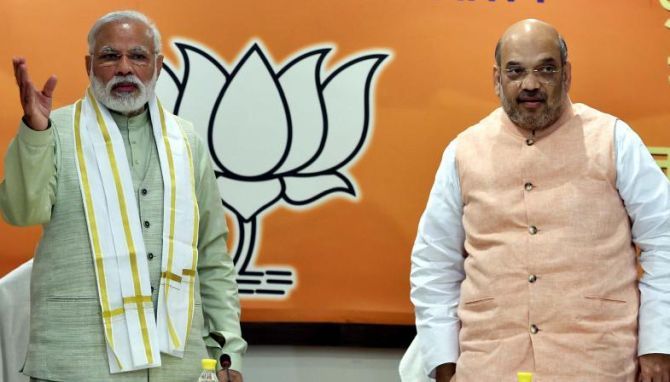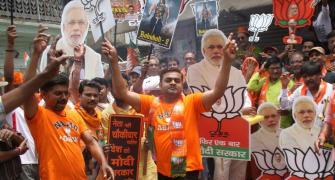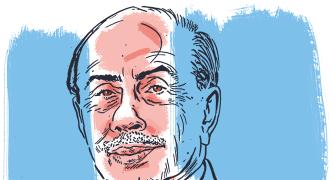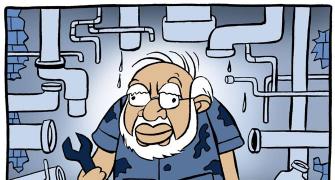Corporate leaders said a stable government at the Centre will help boost infrastructure spend, address agricultural distress, and encouraging employment.

A decisive mandate for the National Democratic Alliance (NDA) on Thursday has raised expectations of a higher pace of economic reforms.
Coming a day after the United Nations (UN) lowered its FY20 gross domestic product (GDP) growth forecast for India, corporate leaders said a stable government at the Centre will help boost infrastructure spend, address agricultural distress, and encouraging employment.
“To me, it is very simple - the people of this country want Narendra Modi to continue his job of restructuring the Indian economy, as well as the governance structure, and lead the country on to a high sustained growth path,” said RC Bhargava, chairman of Maruti Suzuki India.
Anil Agarwal, chairman of Vedanta, said there is a need for simplification of policies and tackling critical issues such as job creation.
“Strengthening India’s position in global trade and ushering in more tax-friendly laws is important,” he said.
Kiran Majumdar Shaw, chairman of Biocon, said the economic engine requires revving up with bolder reforms and the implementation of a simpler GST with minimal slabs to boost sagging businesses and revive consumer spending.
“The agri-rural economy needs urgent attention and farmer producers’ organisations must be the focus,” she added.
Sunil Bharti Mittal, founder and chairman of Bharti Enterprises, said a strong and stable government would be well-placed to give the reform agenda a push.
“This is needed to give an impetus to investor confidence, given the current state of the global economy,” he said.
The UN World Economic Situation and Prospects report, released on Wednesday, said India was in line with the global trend in terms of a broad-based economic slowdown, led by lower consumption demand, industrial production and exports.
The trend prompted the UN to lower its FY20 GDP growth forecast (for India) to 7.1 per cent from 7.5 per cent.
Consumer-facing businesses in categories such as staples and discretionary are already seeing their slowest growth in six quarters, impacting earnings.
Rashesh Shah, chairman and chief executive officer of Edelweiss Group, said: “A majority mandate will help to build on some hard reforms and address some of the challenges upfront.
"The current liquidity tightness in the markets has to ease, and there is a need as well as an opportunity to get both risk appetite and growth back.”
Suresh Narayanan, chairman and managing director of Nestle India, said the new government would have to focus on rural areas in its bid to revive growth.
“With inflationary pressures growing and a forecast of a below-normal monsoon this year, giving impetus to the income of rural households is the need of the hour,” he said.
Zia Mody, founder and managing partner at AZB Partners, said it was vital to re-look at pain points to ensure larger foreign direct investment into the country.
“The government may need to open up more sectors to FDI and look at data localisation and e-commerce sensibly. Transparency and better ease of doing business would be great,” she said.
Niranjan Hiranandani, managing director of the Hiranandani group, said real estate developers were looking at more structural reforms.
“We are hopeful the government will address the liquidity crisis and rationalise taxes by subsuming stamp duty under the GST,” he said.
Venu Srinivasan, chairman of TVS Motor, said transport majors were hoping to see consumer lending make its way back, given that sales are dependent on it.
“We would like to see the Reserve Bank of India relax the cash reserve ratio, putting some money into banks and non-banking financial companies.”
A Vaidheesh, president of Organisation of Pharmaceutical Producers of India, said that healthcare challenges needed to be addressed urgently.
“The first is increasing public spending on healthcare. Second, policy support is necessary to address healthcare financing, including encouraging innovative new models such as social impact bonds.
"Third, policy support for significantly improving the quality of our healthcare infrastructure is crucial, from primary health care centres through district hospitals and tertiary care centres,” he said.
SpiceJet chairman and managing director Ajay Singh said structural challenges in the aviation sector need to be addressed quickly for Indian carriers to become global leaders.
Shally Seth Mohile, Sohini Das, Aneesh Phadnis, Dev Chatterjee, Pavan Lall, Aditi Divekar, Raghavendra Kamath, T E Narasimhan, Arnab Dutta, Megha Manchanda, Jyoti Mukul and Viveat Pinto contributed to this story










